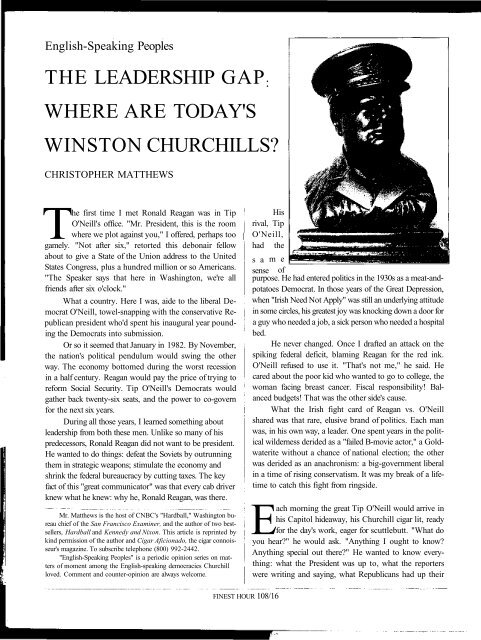journal of the churchill center and societies - Winston Churchill
journal of the churchill center and societies - Winston Churchill
journal of the churchill center and societies - Winston Churchill
- No tags were found...
Create successful ePaper yourself
Turn your PDF publications into a flip-book with our unique Google optimized e-Paper software.
English-Speaking Peoples<br />
THE LEADERSHIP GAP :<br />
WHERE ARE TODAY'S<br />
WINSTON CHURCHILLS<br />
CHRISTOPHER MATTHEWS<br />
The first time I met Ronald Reagan was in Tip<br />
O'Neill's <strong>of</strong>fice. "Mr. President, this is <strong>the</strong> room<br />
where we plot against you," I <strong>of</strong>fered, perhaps too<br />
gamely. "Not after six," retorted this debonair fellow<br />
about to give a State <strong>of</strong> <strong>the</strong> Union address to <strong>the</strong> United<br />
States Congress, plus a hundred million or so Americans.<br />
"The Speaker says that here in Washington, we're all<br />
friends after six o'clock."<br />
What a country. Here I was, aide to <strong>the</strong> liberal Democrat<br />
O'Neill, towel-snapping with <strong>the</strong> conservative Republican<br />
president who'd spent his inaugural year pounding<br />
<strong>the</strong> Democrats into submission.<br />
Or so it seemed that January in 1982. By November,<br />
<strong>the</strong> nation's political pendulum would swing <strong>the</strong> o<strong>the</strong>r<br />
way. The economy bottomed during <strong>the</strong> worst recession<br />
in a half century. Reagan would pay <strong>the</strong> price <strong>of</strong> trying to<br />
reform Social Security. Tip O'Neill's Democrats would<br />
ga<strong>the</strong>r back twenty-six seats, <strong>and</strong> <strong>the</strong> power to co-govern<br />
for <strong>the</strong> next six years.<br />
During all those years, I learned something about<br />
leadership from both <strong>the</strong>se men. Unlike so many <strong>of</strong> his<br />
predecessors, Ronald Reagan did not want to be president.<br />
He wanted to do things: defeat <strong>the</strong> Soviets by outrunning<br />
<strong>the</strong>m in strategic weapons; stimulate <strong>the</strong> economy <strong>and</strong><br />
shrink <strong>the</strong> federal bureaucracy by cutting taxes. The key<br />
fact <strong>of</strong> this "great communicator" was that every cab driver<br />
knew what he knew: why he, Ronald Reagan, was <strong>the</strong>re.<br />
Mr. Mat<strong>the</strong>ws is <strong>the</strong> host <strong>of</strong> CNBC's "Hardball," Washington bureau<br />
chief <strong>of</strong> <strong>the</strong> San Francisco Examiner, <strong>and</strong> <strong>the</strong> author <strong>of</strong> two bestsellers,<br />
Hardball <strong>and</strong> Kennedy <strong>and</strong> Nixon. This article is reprinted by<br />
kind permission <strong>of</strong> <strong>the</strong> author <strong>and</strong> Cigar Aficionado, <strong>the</strong> cigar connoisseur's<br />
magazine. To subscribe telephone (800) 992-2442.<br />
"English-Speaking Peoples" is a periodic opinion series on matters<br />
<strong>of</strong> moment among <strong>the</strong> English-speaking democracies <strong>Churchill</strong><br />
loved. Comment <strong>and</strong> counter-opinion are always welcome.<br />
His<br />
rival, Tip<br />
O'Neill,<br />
had <strong>the</strong><br />
s a m e<br />
sense <strong>of</strong><br />
purpose. He had entered politics in <strong>the</strong> 1930s as a meat-<strong>and</strong>potatoes<br />
Democrat. In those years <strong>of</strong> <strong>the</strong> Great Depression,<br />
when "Irish Need Not Apply" was still an underlying attitude<br />
in some circles, his greatest joy was knocking down a door for<br />
a guy who needed a job, a sick person who needed a hospital<br />
bed.<br />
He never changed. Once I drafted an attack on <strong>the</strong><br />
spiking federal deficit, blaming Reagan for <strong>the</strong> red ink.<br />
O'Neill refused to use it. "That's not me," he said. He<br />
cared about <strong>the</strong> poor kid who wanted to go to college, <strong>the</strong><br />
woman facing breast cancer. Fiscal responsibility! Balanced<br />
budgets! That was <strong>the</strong> o<strong>the</strong>r side's cause.<br />
What <strong>the</strong> Irish fight card <strong>of</strong> Reagan vs. O'Neill<br />
shared was that rare, elusive br<strong>and</strong> <strong>of</strong> politics. Each man<br />
was, in his own way, a leader. One spent years in <strong>the</strong> political<br />
wilderness derided as a "failed B-movie actor," a Goldwaterite<br />
without a chance <strong>of</strong> national election; <strong>the</strong> o<strong>the</strong>r<br />
was derided as an anachronism: a big-government liberal<br />
in a time <strong>of</strong> rising conservatism. It was my break <strong>of</strong> a lifetime<br />
to catch this fight from ringside.<br />
Each morning <strong>the</strong> great Tip O'Neill would arrive in<br />
his Capitol hideaway, his <strong>Churchill</strong> cigar lit, ready<br />
for <strong>the</strong> day's work, eager for scuttlebutt. "What do<br />
you hear" he would ask. "Anything I ought to know<br />
Anything special out <strong>the</strong>re" He wanted to know everything:<br />
what <strong>the</strong> President was up to, what <strong>the</strong> reporters<br />
were writing <strong>and</strong> saying, what Republicans had up <strong>the</strong>ir<br />
FINEST HOUR 108/16

















